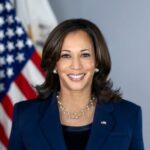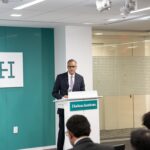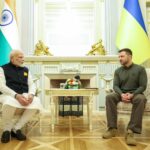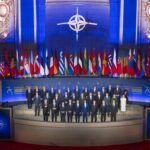Remarks by President Biden before the 79th Session of the United Nations General Assembly, United Nations Headquarters, New York
Full Transcript:
THE PRESIDENT: My fellow leaders, today is the fourth time I’ve had the great honor of speaking to this assembly as president of the United States. It will be my last.
I’ve seen a remarkable sweep of history. I was first elected to office in the United States of America as a U.S. senator in 1972. Now, I know I look like I’m only 40. I know that. (Laughter.)
I was 29 years old. Back then, we were living through an inflection point, a moment of tension and uncertainty. The world was divided by the Cold War. The Middle East was headed toward war. America was at war in Vietnam, and at that point, the longest war in America’s history.
Our country was divided and angry, and there were questions about our staying power and our future. But even then, I entered public life not out of despair but out of optimism.
The United States and the world got through that moment. It wasn’t easy or simple or without significant setbacks. But we would go on to reduce the threat of nuclear weapons throughout the — through arms control and then go on to bring the Cold War itself to an end. Israel and Egypt went to war but then forged a historic peace. We ended the war in Vietnam.
The — last year, in Hanoi, I was — met with the Vietnamese leadership, and we elevated our partnership to the highest level. It’s a testament to the resilience of the human spirit and the capacity for reconciliation that today the United States and Vietnam are partners and friends, and it’s proof that even from the horrors of war there is a way forward. Things can get better.
We should never forget that. I have seen that throughout my career.
In the 1980s, I spoke out against apartheid in South Africa, and then I watched the racist regime fall.
In the 1990s, I worked to hold Milošević accountable for war crimes. He was held accountable.
At home, I wrote and passed the Violence Against Women Act to end the scourge of violence against women and girls not only in America but across the world, as many of you have as well. But we have so much more to do, especially against rape and sexual violence as weapons of war and terror.
We were attacked on 9/11 by Al-Qaeda and Osama bin Laden. We brought him justice.
Then I came to the presidency in another moment in a crisis and uncertainty. I believed America had to look forward. New challenges, new threats, new opportunities were in front of us. We needed to put ourselves in a position to see the threats, to deal with the challenges, and to seize the opportunities as well.
We needed to end the era of war that began on 9/11. As vice president to President Obama, he asked me to work to wind down the military operations in Iraq. And we did, painful as it was.
When I came to office as president, Afghanistan had replaced Vietnam as America’s longest war. I was determined to end it, and I did. It was a hard decision but the right decision.
Four American presidents had faced that decision, but I was determined not to leave it to the fifth. It was a decision accompanied by tragedy. Thirteen brave Americans lost their lives along with hundreds of Afghans in a suicide bomb. I think those lost lives — I think of them every day.
I think of all the 2,461 U.S. military deaths over a long 20 years of that war. 20,744 American servicemen wounded in action. I think of their service, their sacrifice, and their heroism.
I know other countries lost their own men and women fighting alongside us. We honor their sacrifices as well.
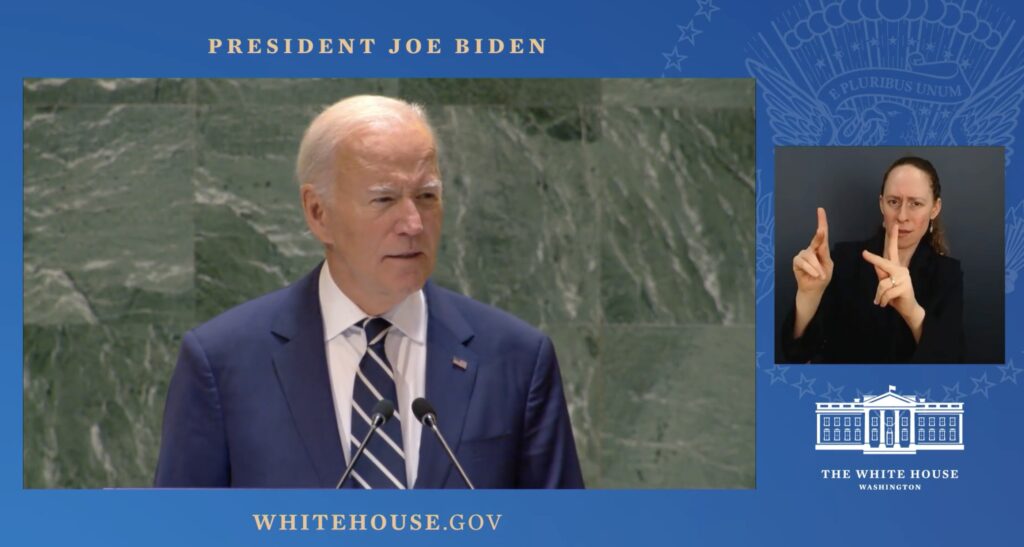
To face the future, I was also determined to rebuild my country’s alliances and partnerships to a level not previously seen. We did — we did just that, from traditional treaty alliances to new partnerships like the Quad with the United States, Japan, Australia, and India.
I know — I know many look at the world today and see difficulties and react with despair, but I do not. I won’t.
As leaders, we don’t have the luxury.
I recognize the challenges from Ukraine to Gaza to Sudan and beyond: war, hunger, terrorism, brutality, record displacement of people, a climate crisis, democracy at risk, strains within our societies, the promise of artificial intelligence and its significant risks. The list goes on.
But maybe because of all I’ve seen and all we have done together over the decades, I have hope. I know there is a wa- — a way forward.
In 1919, the Irish poet William Butler Yeats described a world, and I quote, where “Things fall apart; the centre cannot hold; Mere anarchy is loosed upon the world,” end of quote.
Some may say those words describe the world not just in 1919 but in 2024. But I see a cri- — a critical distinction.
In our time, the center has held. Leaders and people from every region and across the political spectrum have stood together. Turned the page — we turned the page on the worst pandemic in a century. We made sure COVID no longer controls our lives. We defended the U.N. Charter and ensured the survival of Ukraine as a free nation. My country made the largest investment in climate and clean energy ever, anywhere in history.
There will always be forces that pull our countries apart and the world apart: aggression, extremism, chaos, and cynicism, a desire to retreat from the world and go it alone.
Our task, our test is to make sure that the forces holding us together are stronger than those that are pulling us apart, that the principles of partnership that we came here each year to uphold can withstand the challenges, that the center holds once again.
My fellow leaders, I truly believe we are at another inflection point in world history where the choices we make today will determine our future for decades to come.
Will we stand behind the principles that unite us? We stand firm against aggression. We — will we end the conflicts that are raging today? Will we take on global challenges like climate change, hunger, and disease? Will we plan now for the opportunities and risk of a revolutionary new technologies?
I want to talk today about each of those decisions and the actions, in my view, we must take.
To start, each of us in this body has made a commitment to the principles of the U.N. Charter, to stand up against aggression. When Russia invaded Ukraine, we could have stood by and merely protested. But Vice President Harris and I understood that that was an assault on everything this institution is supposed to stand for.

And so, at my direction, America stepped into the breach, providing massive security and economic and humanitarian assistance. Our NATO Allies and partners in 50-plus nations stood up as well. But most importantly, the Ukrainian people stood up. And I ask the people of this chamber to stand up for them.
The good news is Putin’s war has failed in his — at his core aim. He set out to destroy Ukraine, but Ukraine is still free. He set out to weaken NATO, but NATO is bigger, stronger, and more united than ever before with two new members, Finland and Sweden. But we cannot let up.
The world now has another choice to make: Will we sustain our support to help Ukraine win this war and preserve its freedom or walk away and let aggression be renewed and a nation be destroyed?
I know my answer. We cannot grow weary. We cannot look away. And we will not let up on our support for Ukraine, not until Ukraine wins a just and durable peace [based] on the U.N. Charter. (Applause.)
We also need to uphold our principles as we seek to responsibly manage the competition with China so it does not veer into conflict. We stand ready to cooperate on urgent challenges for the good of our people and the people everywhere.
We recently resumed cooperation with China to stop the flow of deadly synthetic narcotics. I appreciate the collaboration. It matters for the people in my country and mether- — many others around the world.
On matters of conviction, the United States is unabashed, pushing back against unfair economic competition and against military coercion of other nations in — in the South China Sea, in maintaining peace and stability across the Taiwan Straits, in protecting our most advanced technologies so they cannot be used against us or any of our partners.
At the same time, we’re going to continue to strengthen our network of alliances and partnerships across the Indo-Pacific. These partnerships are not against any nation. They are building blocks for a free, open, secure, and peaceful Indo-Pacific.
We are also working to bring a greater measure of peace and stability to the Middle East. The world must not flinch from the horrors of October 7th. Any country — any country would have the right and responsibility to ensure that such an attack can never happen again.
Thousands of armed Hamas terrorists invaded a sovereign state, slaughtering and massacring more than 1,200 people, including 46 Americans, in their homes and at a music festival; despis- — despicable acts of sexual violence; 250 innocents taken hostage.
I’ve met with the families of those hostages. I’ve grieved with them. They’re going through hell.
Innocent civilians in Gaza are also going through hell. Thousands and thousands killed, including aid workers. Too many families dislocated, crowding into tents, facing a dire humanitarian situation. They didn’t ask for this war that Hamas started.
I put forward with Qatar and Egypt a ceasefire and hostage deal. It’s been endorsed by the U.N. Security Council. Now is the time for the parties to finalize its terms, bring the hostages home, en- — secure security for Israel, and Gaza free of Ha- — of Hamas’ grip, ease the suffering in Gaza, and end this war.
On October 7th — (applause) — since October 7, we have also been determined to prevent a wider war that engulfs the entire region. Hezbollah, unprovoked, joined the October 7th attack launching rockets into Israel. Almost a year later, too many on each side of the Israeli-Lebanon border remain displaced.
Full-scale war is not in anyone’s interest. Even as the situation has escalated, a diplomatic solution is still possible. In fact, it remains the only path to lasting security to allow the residents from both countries to return to their homes on the border safely. And that’s what working — that’s what we’re working tirelessly to achieve.
As we look ahead, we must also address the rise of violence against innocent Palestinians on the West Bank and set the conditions for a better future, including a two-state solution, where the world — where Israel enjoys security and peace and full recognition and normalized relations with all its neighbors, where Palestinians live in security, dignity, and self-determination in a state of their own. (Applause.)
Progress toward peace will put us in a stronger position to deal with the ongoing threat posed by Iran. Together, we must deny oxygen to terrorists — to its terrorist proxies, which have called for more October 7ths, and ensure that Iran will never, ever obtain a nuclear weapon.
Gaza is not the only conflict that deserves our outrage. In Sudan, a bloody civil war unleashed one of the world’s worst humanitarian crises: eight million — eight million on the brink of famine, hundreds of thousands already there, atrocities in Darfur and elsewhere.
The United States has led the world in providing humanitarian aid to Sudan. And with our partners, we have led diplomatic talks to try to silence the guns and avort — and avert a wider famine. The world needs to stop arming the generals, to speak with one voice and tell them: Stop tearing your country apart. Stop blocking aid to the Sudanese people. End this war now. (Applause.)
But people need more than the absence of war. They need the chance — the chance to live in dignity. They need to be protected from the ravages of climate change, hunger, and disease.
Our administration has arri- — has invested over $150 billion to make progress and other Sustainable Development Goals. It includes $20 billion for food security and over $50 billion for global health. We’ve mobilized billions more in private-sector investment.
We’ve taken the most ambitious climate actions in history. We’ve moved to rejoin the Paris Agreement on day one. And today, my country is finally on track to cut emissions in half by 2030, on track to honor my pledge to quadruple climate financing to developing nations with $11 billion thus far this year.
We’ve rejoined the World Health Organization and donated nearly 700 million doses of COVID vaccine to 117 countries. We must now move quickly to face mpox outbreak in Africa. We are prepared to commit $500 million to help African countries prevent and respond to mpox and to donate 1 million doses of mpox vaccine now. (Applause.) We call on our partners to match our pledge and make this a billion-dollar commitment to the people of Africa.
Beyond the core necessities of food and health, the United States, the G7, and our partners have embarked on an ambitious initiative to mobilize and deliver significant financing to the developing world. We are working to help countries build out their infrastructure, to clean energy transition, to their digital transformation to lay new economic foundations for a prosperous future.
It’s called the Partnership for Global Infrastructure and Investment. We’ve already starting to see the fruits of this emerge in Southern Africa and in Southeast A- — Asia and in the Americas. We have to keep it going.
I want to get things done together. In order to do that, we must build a stronger, more effective, and more inclusive United Nations. The U.N. needs to adapt to bring in new voices and new perspectives. That’s why we support reforming and expanding the membership of the U.N. Security Council. (Applause.)
My U.N. ambassador just laid out our detailed vision to reflect today’s world, not yesterday’s. It’s time to move forward.
And the Security Council, like the U.N. itself, needs to get back to the job of making peace; of brokering deals to end wars and suffering; th- — (applause) — and to stop the spread of the most dangerous weapons; of stabilizing troubled regions in East Africa — from East Africa to Haiti, to Kenya-led mission that’s working alongside the Haitian people to turn the tide.
We also have a responsibility to prepare our citizens for the future. We’ll see more technological change, I argue, in the next 2 to 10 years than we have in the last 50 years.
Artificial intelligence is going to change our ways of life, our ways of work, and our ways of war. It could usher in scientific progress at a pace never seen before. And much of it could make our lives better.
But AI also brings profound risks, from deepfakes to disinformation to novel pathogens to bioweapons.
We have worked at home and abroad to define the new norms and standards. This year, we achieved the first-ever General Assembly resolution on AI to start developing global rules — global rules of the road. We also announced a Declaration of — on the Responsible — Responsible Use of AI, joined by 60 countries in this chamber.
But let’s be honest. This is just the tip of the iceberg of what we need to do to manage this new technology.
Nothing is certain about how AI will evolve or how it will be deployed. No one knows all the answers.
But my fellow leaders, it’s with humility I offer two questions.
First: How do we as an international community govern AI? As countries and companies race to uncertain frontiers, we need an equally urgent effort to ensure AI’s safety, security, and trustworthiness. As AI grows more powerful, it must grow also — it also must grow more responsive to our collective needs and values. The benefits of all must be shared equitably. It should be harnessed to narrow, not deepen, digital divides.
Second: Will we ensure that AI supports, rather than undermines, the core principles that human life has value and all humans deserve dignity? We must make certain that the awesome capabilities of AI will be used to uplift and empower everyday people, not to give dictators more powerful shackles on human — on the human spirit.
In the years ahead, there wa- — they may be — may well be no greater test of our leadership than how we deal with AI.
Let me close with this. Even as we navigate so much change, one thing must not change: We must never forget who we’re here to represent.
“We the People.” These are the first words of our Constitution, the very idea of America. And they inspired the opening words of the U.N. Charter.
I’ve made the preservation of democracy the central cause of my presidency.
This summer, I faced a decision whether to seek a second term as president. It was a difficult decision. Being president has been the honor of my life. There is so much more I want to get done. But as much as I love the job, I love my country more. I decided, after 50 years of public service, it’s time for a new generation of leadership to take my nation forward.
My fellow leaders, let us never forget, some things are more important than staying in power. It’s your people — (applause) — it’s your people that matter the most.
Never forget, we are here to serve the people, not the other way around. Because the future will be — the future will be won by those who unleash the full potential of their people to breathe free, to think freely, to innovate, to educate, to live and love openly without fear.
That’s the soul of democracy. It does not belong to any one country.
I’ve seen it all around the world in the brave men and women who ended apartheid, brought down the Berlin Wall, fight today for freedom and justice and dignity.
We saw it — that universal yearning for rights and freedom — in Venezuela, where millions cast their vote for change. It hasn’t been recognized, but it can’t be denied. The world knows the truth.
We saw it in Uganda LBGT [LGBT] activists demanding safety and recognition of their common humanity.
We see it in citizens across the world peacefully choosing their future — from Ghana to India to South Korea, nations representing one quarter of humanity who will hold elections this year alone.
It’s remarkable, the power of “We the People,” that makes me more optimistic about the future than I’ve ever been since I was first elected to the United States Senate in 1972.
Every age faces its challenges. I saw it as a young man. I see it today.
But we are stronger than we think. We’re stronger together than alone. And what the people call “impossible” is just an illusion.
Nelson Mandela taught us, and I quote, “It always seems impossible until it’s done.” “It always seems impossible until it’s done.”
My fellow leaders, there is nothing that’s beyond our capacity if we work together. Let’s work together.
God bless you all. And may God protect all those who seek peace.
Thank you. (Applause.)



